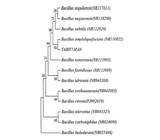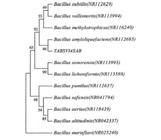ABSTRACT
Phenotypic profiles for microbial identification are unusual for rare, slow-growing and fastidious microorganisms. In the last decade, as a result of the widespread use of PCR and DNA sequencing, 16S rRNA sequencing has played a pivotal role in the accurate identification of microorganisms and the discovery of novel isolates in microbiology laboratories. The 16S rRNA region is universally distributed among microorganisms and is species-specific. Accordingly, the aim of our study was the genotypic identification of microorganisms isolated from non-parenteral pharmaceutical formulations. DNA was separated from five isolates obtained from the formulations. The target regions of the rRNA genes were amplified by PCR and sequenced using suitable primers. The sequence data were analyzed and aligned in the order of increasing genetic distance to relevant sequences against a library database to achieve an identity match. The DNA sequences of the phylogenetic tree results confirmed the identity of the isolates as Bacillus tequilensis, B. subtilis, Staphylococcus haemolyticus and B. amyloliqueficians. It can be concluded that 16S rRNA sequence-based identification reduces the time by circumventing biochemical tests and also increases specificity and accuracy.
Uniterms:
Non-parenteral products/microbiological contamination; Microbes/identification/non-parenteral products; Phylogenetic analysis/microbial identification; 16S rRNA/use/microbial identification

 Thumbnail
Thumbnail
 Thumbnail
Thumbnail
 Thumbnail
Thumbnail
 Thumbnail
Thumbnail
 Thumbnail
Thumbnail
 Thumbnail
Thumbnail
 Thumbnail
Thumbnail
 Thumbnail
Thumbnail
 Thumbnail
Thumbnail
 Thumbnail
Thumbnail









